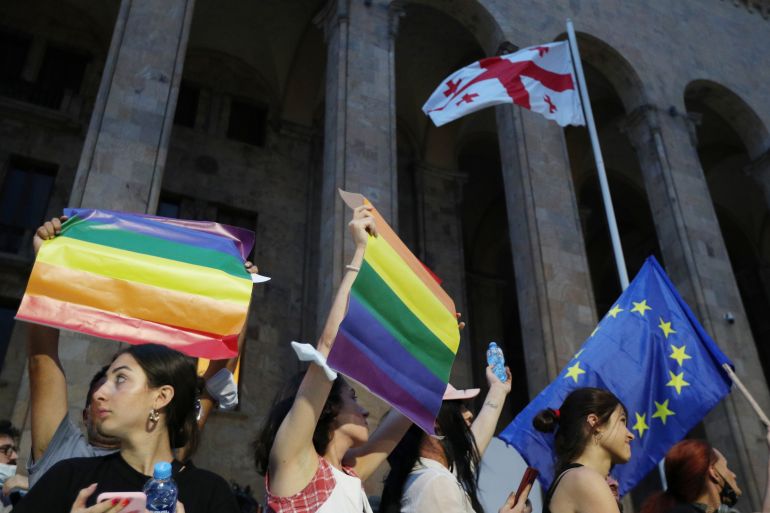Georgia’s parliament approves law curbing LGBTQ rights
‘Family values’ bill is adopted despite being denounced by the president, rights groups and the European Union.
Protesters hold flags during a pro-LGBTQ rally in Tbilisi, Georgia on July 6, 2021 [File: Irakli Gedenidze/Reuters]Published On 17 Sep 202417 Sep 2024
Georgian politicians have approved the third and final reading of a law on “family values and the protection of minors” that would impose sweeping curbs on LGBTQ rights.
The bill, adopted on Tuesday, would provide a legal basis for authorities to outlaw Pride events and public displays of the LGBTQ rainbow flag, and to impose censorship of films and books.
It also bans gender transition, adoption by gay and transgender people, and nullifies same-sex marriages performed abroad on Georgian territory.
In a vote boycotted by the opposition, politicians from the ruling Georgian Dream voted 84 to 0 to approve the bill along with related amendments to a number of other laws.
Leaders of the governing Georgian Dream party say it is needed to safeguard “traditional moral standards” in Georgia, whose deeply conservative Orthodox Church is highly influential.
Tamara Jakeli, director of the campaign group Tbilisi Pride, said the bill, which also restates an existing ban on same-sex marriage and bans gender reassignment surgery, would likely force her organisation to close its doors.
“This law is the most terrible thing to happen to the LGBT community in Georgia,” Jakeli, 28, told the Reuters news agency. “We will most likely have to shut down. There is no way for us to continue functioning.”
Georgian President Salome Zourabichvili, whose powers are mostly ceremonial, has been a critic of Georgian Dream and indicated that she will block the bill.
However, Georgian Dream and its allies have enough seats in parliament to override her veto.
LGBTQ rights are a fraught topic in Georgia, where polls show broad disapproval of same-sex relationships, and the constitution bans same-sex marriage.
Participants in Tbilisi’s annual Pride marches have come under physical attack by anti-LGBTQ protesters in recent years.
The issue has become more prominent ahead of the upcoming October 26 election, where Georgian Dream is seeking a fourth term in office and is campaigning heavily against LGBTQ rights.
The governing party, whose top candidate for the election is billionaire and former Prime Minister Bidzina Ivanishvili, has deepened ties with neighbouring Russia as relations with Western countries have soured.
Earlier this year, it passed a law on “foreign agents” that European and United States critics said is authoritarian and Russian-inspired. Its passage prompted some of the largest protests that Georgia has seen since independence from the Soviet Union in 1991.
Opinion polls suggest the party, which in 2014 passed a law banning anti-LGBTQ discrimination before later pivoting to more conservative positions, remains Georgia’s most popular, though it has lost ground since 2020, when it won a narrow majority in parliament.
In one governing party advertisement aired on Georgian television, Pride director Jakeli’s face is shown alongside the words: “No to moral degradation”.
The European Union has said the bill’s adoption would have “important repercussions” on EU-hopeful Tbilisi’s European integration path and “will place further strain on EU-Georgia relations”.
“The EU recalls that Georgia’s accession process is de facto halted and urges the authorities to recommit to the EU integration path,” the EU has said.
